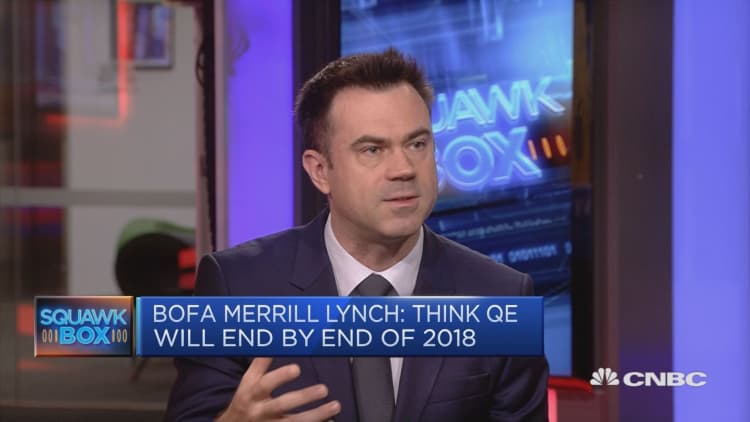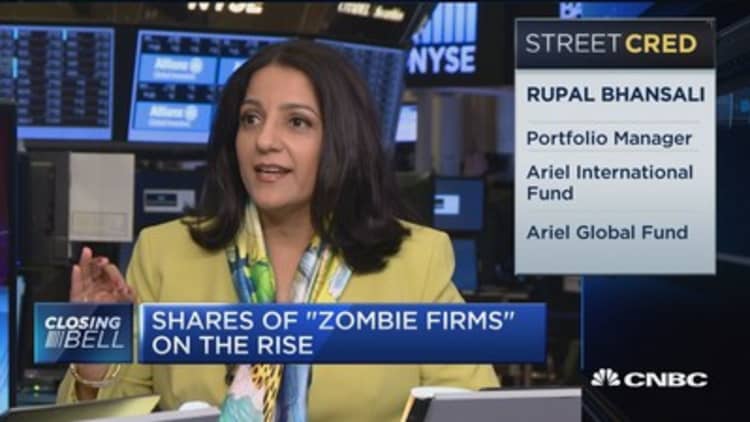
The European Central Bank (ECB) needs to beware of raising interest rates too quickly as there are a significant number of "zombie firms" in Europe that have become too dependent on cheap credit, according to analysis by the Bank of America Merrill Lynch.
Barnaby Martin, head of European Credit Strategy at BofA Merrill Lynch, said businesses in Europe which have benefited from the ECB's corporate bond purchase program would struggle once the bank raises interest rates, expected sometime in 2018.
"The worst kept secret in the market is (ECB President) Mario Draghi is going to be tapering monetary policy next year and yet last week he was super, super dovish so I think that we've forgotten that monetary policy in Europe is on its way out," he told CNBC on Tuesday, adding "there's clearly political pressure for him to move away from this extraordinary era."
"So the question becomes 'can we handle a rapid rise in interest rates?'," he said.
ECB stimulus measures as part of its quantitative easing program designed to boost the European economy currently amount to 60 billion euros ($69.9 billion) a month. Some of this money goes into purchasing corporate bonds.
Has the ECB helped troubled companies?
While these purchases have enabled companies to continue to operate and invest, aiding a recovery in the European economy, the bank's purchases have been credited for keeping ailing companies alive, hence the name "zombies."
The ECB started purchasing corporate bonds in June 2016 as part of its "corporate sector purchase program" (CSPP) and, as of June 7, 2017, its CSPP holdings stood at 92 billion euros, the bank said.
In a note examining "The rise of the Zombies" BofA Merrill Lynch's credit strategists Martin, Ionnis Angelakis and Souhair Asba noted that 9 percent of non-financial companies in Europe (by market cap of Stoxx 600) are zombies, with "very weak interest coverage metrics."

"Note that this is still quite a high number: It was around 6 percent pre-Lehman, and fell to 5 percent in late 2013 after the peripheral crisis had faded," they said.
"The plethora of monetary support in Europe over the last 5 years has allowed companies with weak profitability to continue to refinance their debt and stave off defaults." The analyst team also noted that bond issuance had been concentrated in "the hands of a few."
"Year-to-date, the top 20 bonds issuers have accounted for 40 percent of supply. In 2015 and 2016, the number was closer to 25 percent. The result has been that "superfirms" have been quietly building across the credit market," they noted.
Would companies suffer under higher interest rates?
"(While) corporate leverage is down, if you look at it from a different way, interest coverage – and that's where the whole zombie phenomena comes from -- you find in Europe that there is this whole group of companies that would struggle under much higher interest rates," Martin told CNBC.
"(The number of zombie companies is) higher than it was pre-Lehman (Brothers), it's higher than it was in mid to late-2013 after the Greek saga, there is this area of financial vulnerability in Europe."
Smaller firms, mainly in peripheral European countries and particularly in utility and energy sector, are most vulnerable to higher interest rates, Martin said, adding that he hoped the ECB would take note and be "super patient" in the timing of its tapering program.
"We think this should motivate the ECB to reduce QE in a slow and patient manner and hold-off on substantial rate hikes in the near-term (as our economists have been insisting). Allowing a (German) bund shock and a credit tantrum to take hold would only pressure corporate interest costs again, and risk a rise of the zombies," BofA's strategists warned.


